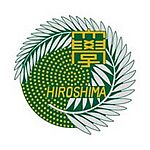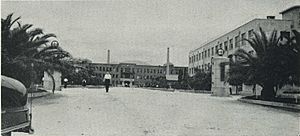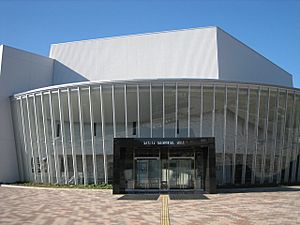Hiroshima University facts for kids
|
広島大学
|
|
 |
|
| Motto | Try New Things, Do New Things |
|---|---|
| Type | Public (National) |
| Established | 1929 (chartered 1949) |
| Endowment | 63.7 billion Yen (2006) |
| President | Mitsuo Ochi |
|
Academic staff
|
3,222 |
| Undergraduates | 11,322 |
| Postgraduates | 3,358 |
| 1,756 | |
| Location | , , |
| Campus | 3.2 km2 |
| Affiliations | BME, CNU, FU, HMU, JMU, HHJ, UNPAR, LTU, LE, MU, RU, SU |
| Website | hiroshima-u.ac.jp |
Hiroshima University (広島大学, Hiroshima Daigaku) is a national research university in Japan. It is located in two cities: Higashihiroshima and Hiroshima. The university was first started in 1929. It became a full university in 1949 after several schools joined together. People often call it Hirodai for short.
Contents
History of Hiroshima University
Hiroshima University was officially created on May 31, 1949. This happened after World War II, when Japan changed its entire school system. The goal was to have one national university in each area.
Hiroshima University was formed by combining many older schools in the Hiroshima area. These schools were already important for education.
Schools That Formed the University
Eight different schools came together to create Hiroshima University. These included:
- Hiroshima University of Literature and Science
- Hiroshima Higher Normal School
- Hiroshima Women's Higher Normal School
- Hiroshima Higher School
- Hiroshima Normal School
- Hiroshima Youth Normal School
- Hiroshima Higher Technical School
- Hiroshima Municipal Higher Technical School
Later, between 1953 and 1956, Hiroshima Medical College also joined the university.
Important Early Schools
Some of the schools that joined were very well-known. For example, the Hiroshima School of Secondary Education, started in 1902, was one of the main places in Japan for training middle school teachers. The Hiroshima University of Literature and Science, founded in 1929, was also a highly respected national university.
The Hiroshima Higher Technical School, started in 1920, trained many people who went on to work in manufacturing. The Hiroshima Higher School, founded in 1923, prepared students for top universities.
Reconstruction and Relocation
These schools faced a lot of damage from the atomic bomb that hit Hiroshima on August 6, 1945. However, they were rebuilt. After being reconstructed, they combined to form the new Hiroshima University.
Graduate schools were added in 1953. To make more space, the university decided to move to Higashihiroshima in 1972. The move happened gradually between 1982 and 1995. Today, some parts of the university, like the schools for medicine and dentistry, are still in Hiroshima City.
Academic Programs and Research
| THE National | General | 11 | |
|---|---|---|---|
| QS Asia (Asia version) |
General | 96 | |
| THE Asia (Asia version) |
General | =150 | |
| THE World | General | 601–800 | |
| QS World | General | 480= | |
| ARWU World | Research | 501–600 | |
Hiroshima University offers many different subjects for students to study. It has various schools for undergraduate students and graduate schools for advanced studies.
Schools for Undergraduate Students
- School of Integrated Arts and Sciences
- School of Letters
- School of Education
- School of Law
- School of Economics
- School of Science
- School of Medicine
- School of Dentistry
- School of Pharmaceutical Sciences
- School of Engineering
- School of Applied Biological Science
- School of Informatics and Data Science
Graduate Schools for Advanced Studies
- Graduate School of Humanities and Social Sciences
- Graduate School of Advanced Science and Engineering
- Graduate School of Integrated Sciences for Life
- Graduate School of Biomedical and Health Sciences
- Graduate School of Innovation and Practice for Smart Society
Research Institutes
The university also has special places for research, like the Miyajima Natural Botanical Garden.
University Campuses
Hiroshima University has three main campus locations:
- Higashi-Hiroshima Campus: Located at Kagami-yama 1-chome, Higashihiroshima. This is the main campus.
- Kasumi Campus: Located at 1-2-3, Kasumi, Minami-ku, Hiroshima. This campus focuses on medical and health sciences.
- Higashisenda Campus: Located at 1-1-89, Higashi-senda-machi, Naka-ku, Hiroshima. This campus includes the Law School.
Notable People from Hiroshima University
Many successful people have studied at Hiroshima University.
People in Politics
- Wataru Kubo: A former member of Japan's national parliament, who also served as Deputy Prime Minister and Minister of Finance.
- Osamu Fujimura: A former member of Japan's national parliament, who served as Chief Cabinet Secretary.
- Chōbyō Yara: A former leader of the government in the Ryukyu Islands and Governor of Okinawa Prefecture.
- Yura Halim: A former Chief Minister of Brunei and Brunei's Ambassador to Japan.
People in Business
- Takeshi Taketsuru: A former President of Nikka Whisky Distilling, a well-known company.
People in Academics and Science
- Kuniyoshi Obara: An important scholar in education and the founder of Tamagawa Gakuen and Tamagawa University.
- Shintaro Uda: An engineer and professor known for his work in electronics.
- Yoshio Koide: A theoretical physicist and professor.
- Tsutomu Yanagida: A physicist and professor.
- Tomoyuki Nishita: An engineer and professor.
- Akira Miyawaki: A botanist and professor, known for his work in ecology.
People in Arts and Culture
- Hiroko Oyamada: An author of fiction who won the Akutagawa Prize.
- Fumiyo Kōno: A manga artist.
- Kōhei Kiyasu: A voice actor, actor, and scriptwriter.
- Kenzō Tange: A famous architect who won the Pritzker Architecture Prize.
- Hiroyuki Agawa: An author and literary critic.
Other Notable People
- Sunao Tsuboi: An activist who worked for peace and against nuclear weapons.
See also
 In Spanish: Universidad de Hiroshima para niños
In Spanish: Universidad de Hiroshima para niños
- List of universities in Japan
 | Jackie Robinson |
 | Jack Johnson |
 | Althea Gibson |
 | Arthur Ashe |
 | Muhammad Ali |



